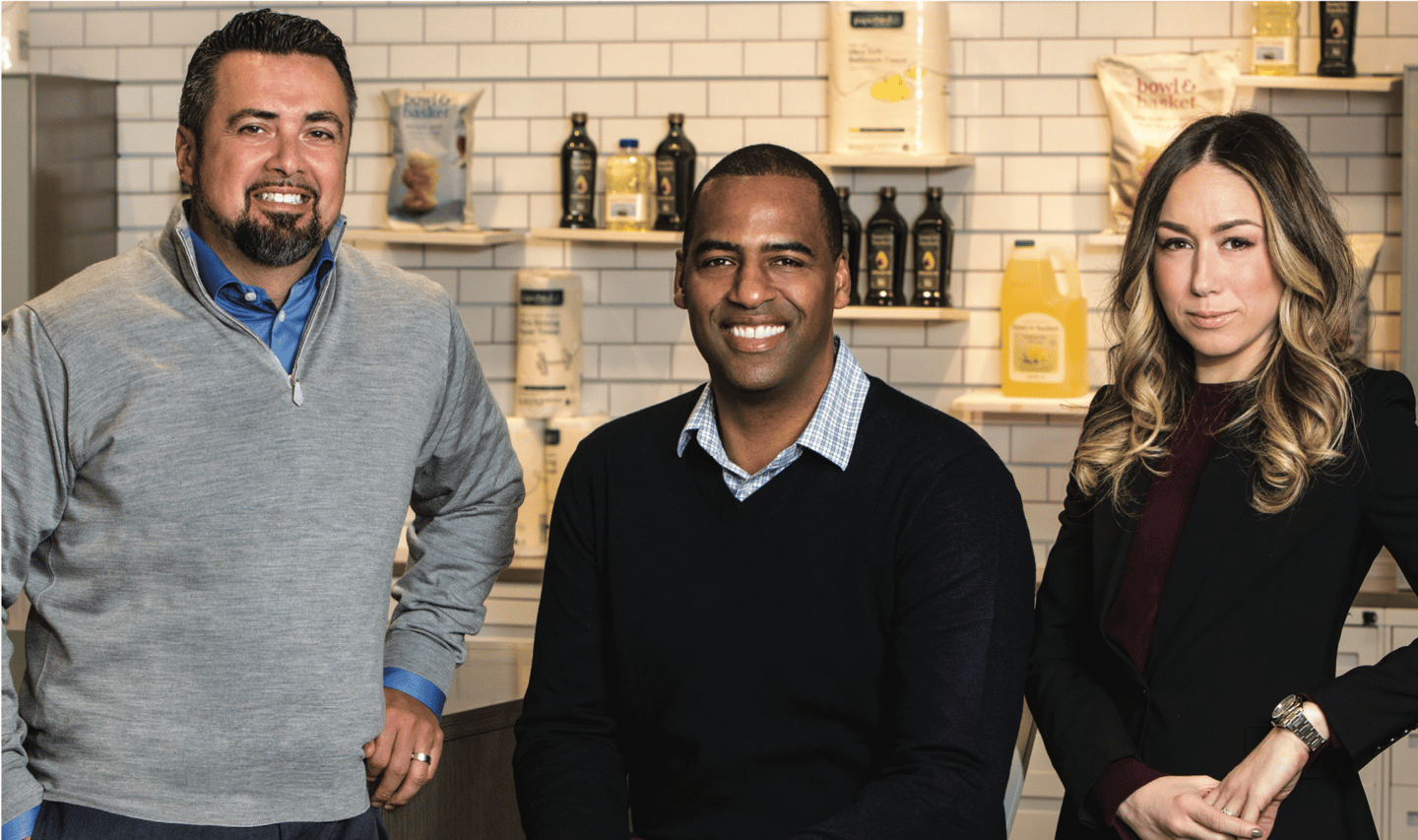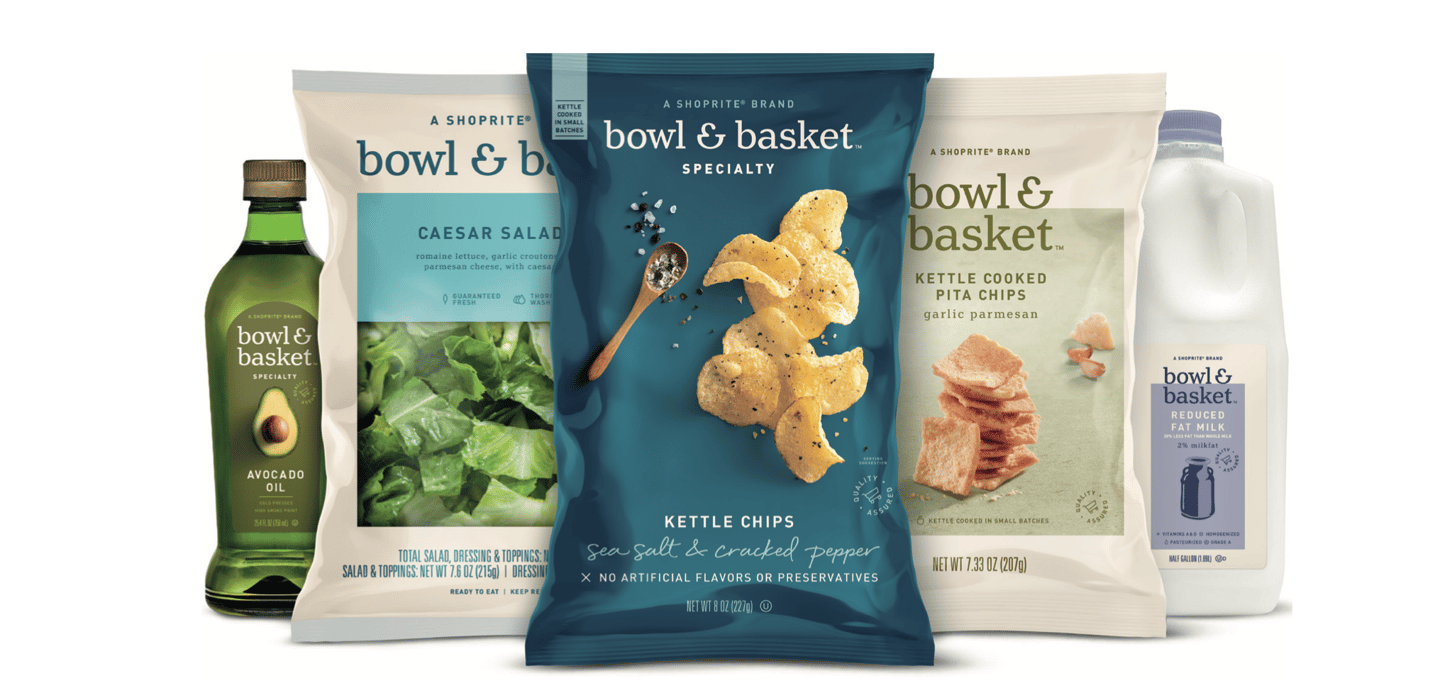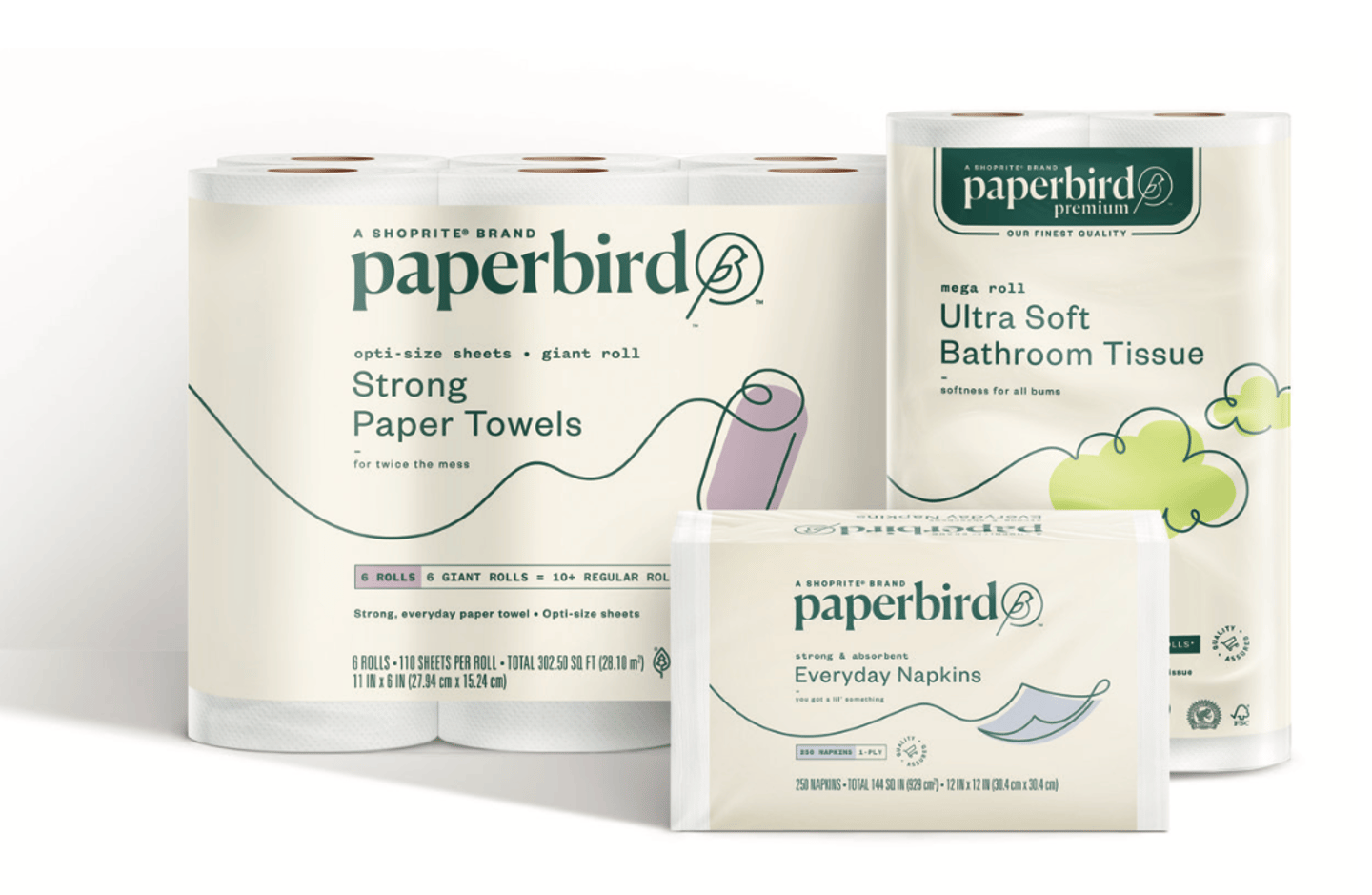Retailer Profile: ShopRite shakes it up
Chris Skyers calls ShopRite’s revamped store brands portfolio “a transformational moment” for the Keasbey, N.J.-based grocer.
For nearly a year, Skyers, the vice president of private label and own brands for Wakefern Corp., the retailer-owned cooperative that operates ShopRite’s nearly 300 stores, has led a team of store brand professionals in developing two new store brands for the revamped portfolio: Bowl & Basket, a food line; and Paperbird, a household products line.
Recognizing its private brands needed a makeover to keep up with its competition and to keep up with the latest consumer demands, ShopRite introduced its sweeping new store brands program in early November. By the end of the year, about 300 items in the two lines will be introduced to ShopRite stores in the six Eastern states it serves: Connecticut, Delaware, Maryland, New Jersey, New York and Pennsylvania. More than 3,500 newly branded products will be on shelves by the end of 2021.
To streamline and simplify the shopping experience for customers, ShopRite will convert previous private brands lines — ShopRite, ShopRite Kitchen, ShopRite Trading Company and Cape Gourmet — to Bowl & Basket and Paperbird. The transformation will take about 18 to 20 months.
“We surveyed thousands of our customers to find out what they love about ShopRite, and what they’d like to see more of on our shelves,” Skyers explains. “We learned that they love what ShopRite stands for — community and great value — but that they also expected a little more from us when it comes to our own brand offerings. We set out to exceed those expectations. Bowl & Basket and Paperbird products are tailored to our shoppers and based on what they told us they want and need — incredible quality at affordable prices.”
Included in the insight gleaned from ShopRite’s customers was one tidbit of tremendous information: It is that ShopRite’s customers don’t like non-food products and food products branded under the same name.
“That was a unique learning for us,” Skyers says, noting that ShopRite had been offering food and non-food products under the same private brand line. “We realized that diapers and milk didn’t go well together under [the same store brand] for many consumers.”
Skyers also says the team learned from its consumer research that it could offer different tiers of products under one store brand.
“We learned we could offer a core offering and within that same portfolio we could offer a premium space,” he says.
About those STORE brands
The Bowl & Basket food line features products that are national brand equivalent or better and a premium segment that features items similar to those offered as part of ShopRite Trading Company, a line the retailer rolled out in 2018 consisting of artisanal foods inspired by different world cuisines.
Under Bowl & Basket, shoppers will currently find products ranging from avocado oil to a new line of kettle-cooked potato chips to milk and water. Also new are 16 different salads, including sesame Asian salad kits, chopped romaine, coleslaw, Italian blends and spring mix arugula. Of course, many more products are on the way in 2020.
“There’s a lot of white space in the premium segment, so we can really add to the line,” Skyers says.
More Bowl & Basket products will eventually land in the fresh section, where Skyers sees a tremendous opportunity to capitalize.
“We think some of our biggest opportunities are in the perimeter of the store,” Skyers says. “I think that’s where people will see a lot of innovation.”
With Bowl & Basket, ShopRite wanted a name that connected with consumers and then delivered on that connection with relevant products.
“Think of the name of the brand — it’s from our basket to your bowl,” Skyers states. “It really captures the essence of who we are at our core — that we’re taking care of families, and this brand understands what that means and how we should be thinking about our customers.”
The non-food Paperbird lineup includes high-design, low-cost cleaning paper products and club-sized items such as bath tissue and paper towels.
“When you think about paper, cups and utensils, we realized there was white space in that area as well, so we set out to create three tiers in that space,” Skyers says, noting that Paperbird offers national brand equivalent or better items, premium products, and items that are more earth-friendly and sustainable.
A need for change
Skyers, who has been with Wakefern for 20 years but assumed his current position in 2018, says ShopRite knew it needed to shake up its store brand portfolio to differentiate. The signs were all there.
First, store brands have never been more popular among consumers. Nearly one of every four products sold in the U.S. today is a retailer’s own brand, according to the Private Label Manufacturers Association (PLMA). In 2018, sales of private label grew by 4.4%, four times as much as national brands, representing a gain of $5.5 billion, according to the PLMA and market researcher Nielsen. IRI recently estimated that private label sales are up nearly 4% in 2019.
Skyers is also well aware of the success that retailers like Trader Joe’s, ALDI and Lidl are having with store brands. He also knows that consumers’ perceptions of store brands have changed for the better.
“So it was an imperative to ensure that we were moving with our shoppers, and we were answering their needs,” he says.
Skyers believes he and his team have accomplished their goal of offering excellent products at a great price. In today’s world of private label, that’s called value, and it seems to be the calling card for successful store brands programs.
“We took a very methodical approach, going category by category,” Skyers says of the makeover. “We were not just switching labels here.”
Every product in each category underwent rigorous testing for sourcing and quality, he adds. “And within each of those categories, we are certainly going to be looking at innovation to ensure that we have the most relevant portfolio for our shoppers,” Skyers adds.
“We feel like we nailed it on this,” he notes. “The brands are consumer-centric and are geared toward the shoppers. And that’s markedly different from what we were offering before. It feels good to see all this exciting change taking place.”
A five-year plan
Skyers and his team implemented a five-year strategic plan a little more than a year ago to establish the new portfolio, which also includes Wholesome Pantry, an organic and free-from line that ShopRite introduced about three years ago and continues to achieve year-over-year growth of 20% or more.
A key part of the five-year plan was to build an infrastructure, Skyers says. Questions needed to be asked, such as if the retailer had the resources to embark on its goal.
“We quickly realized that we needed to solidify our team,” Skyers says.
Key members of the private brands team are: Wil Magistrelli, director of innovation for own brands, who has been with the company for 21 years but joined the own brands team about a year ago; Laura Kind, director of marketing and packaging for own brands, who came from Walmart about a year ago; Jenna Elznic, quality and regulatory manager for own brands; Joseph Guzman, own brand retail execution manager; and Pam Ofri, own brand sourcing manager.
The store brands team has been more involved with experts in other company divisions, including marketing, packaging, product development and innovation, sourcing, quality assurance and in-store execution. Skyers says it’s vital for the experts in those divisions to counsel the store brands team in their respective areas to create what he calls “a center of excellence.”
“The fact that the company has made this level of commitment is a sign of how committed we are to drive this initiative,” Skyers adds.
The team took on an almost start-up company mentality.
“We created an environment where the team could quickly ideate and bring ideas to market, which was somewhat unique to the organization,” he says.
The team was also empowered to think quick and move fast.
“We were able to create an organization that was built for speed,” Skyers says.
The success of the new store brands also hinges on building better supplier relationships, Skyers says, noting that such relationships couldn’t be transactional and needed to be long-term and more strategic.
“If you think about having the highest-quality products at the lowest possible cost, you’re not going to get that with a transactional relationship,” he says. “It’s not the supplier’s product that the supplier is shipping to ShopRite and then it becomes ShopRite’s product to sell to consumers.”
Rather, the mindset has to be that the product belongs to both the supplier and the retailer, Skyers stresses. “When you can have a mindset like that, you can then have an open-book relationship where you can truly innovate together. You can create efficiencies through better relationships and better understanding.”
Increasing market share
The five-year plan isn’t about ShopRite’s store brand program catching up with the competition, Skyers stresses. It’s more about leapfrogging the competition. But a final part of the plan is to increase ShopRite’s private label market share from 13% to 30% in five years.
“We will absolutely get there,” Skyers insists.
He says the stage is set for ShopRite’s private brands to succeed — and at the expense of branded products.
“I believe the brands have taken their eye off the ball when it comes to truly listening to consumers and understanding their needs,” he adds.
While the new store brands are expected to lead to new business, higher product margins and new revenue, which Skyers calls a benefit of the process, the main goal of the revamp goes back to the initial goal — to offer consumers the best quality products at the best prices.
“And we’re very confident that over time our shoppers will certainly gravitate to the new portfolio, and the organization will be very successful,” he adds.
Skyers just might be one of ShopRite’s best customers of the Bowl & Basket and Paperbird products.
“One of my favorites is the premium quality paper towel in the Paperbird line,” he says. “My household uses a lot of paper towels, and it’s good to have a quality item at a low price.”
In Bowl & Basket, Skyers says he’s a sucker for salty snacks and expects to be a loyal consumer of the chip products in the line.
“We have these amazing pita chips,” he says. “That product will be easy pickings for me.”




